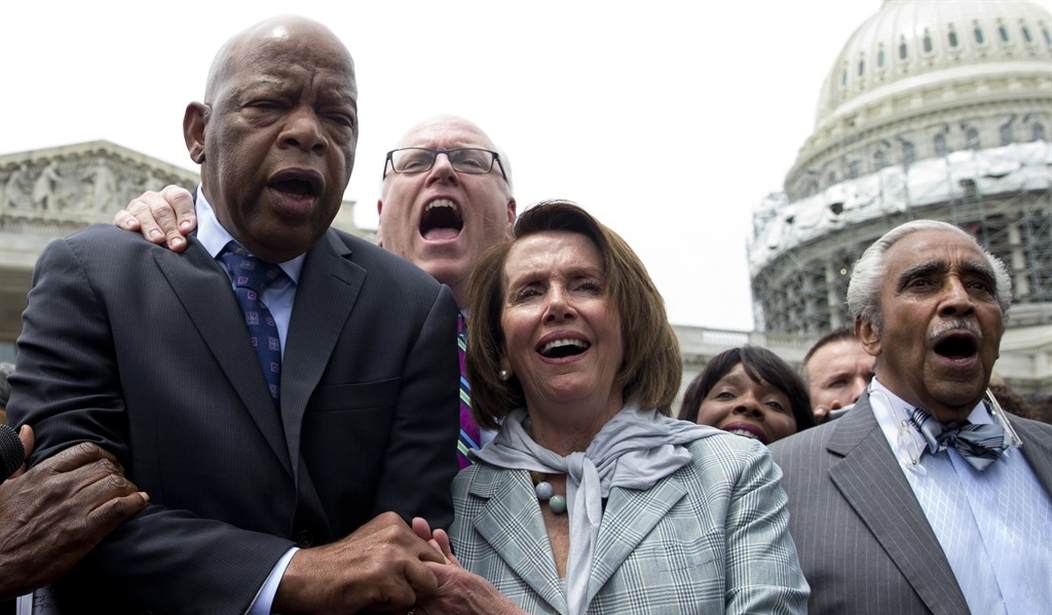Paul Krugman may understand the Democratic Party better than most Democrats do. The New York Times editorial writer describes Democrats as a “coalition of social groups, from teachers’ unions to Planned Parenthood, seeking specific benefits from government action.” More often than not, what these groups want from government is at someone else’s expense.
That isn’t just a characteristic of the party. That’s what the Democratic Party is.
There are also groups that support Republicans: gun owners, small business owners, evangelicals, etc. But Republican groups tend to not want anything from government. More often than not they just want to be left alone. As Krugman sees it, Republicans are far more concerned with general principles or ideology.
Although Krugman often likes to characterize Republicans as Ayn Rand individualists, the typical Democrat is far more self-interested – in a bad sense of the word. Democratic groups tend to base their loyalty to the party solely on what political favors the party can deliver to the group.
There are no overriding principles here. The party is always seeking opportunities to take from Peter and give to Paul. Paul can be rich or he can be poor. Ditto for Peter. All that really matters is that Paul promises a bigger reward (in terms of votes, campaign contributions, etc.)
Think of the political system as a sort of Hobbesian jungle, in which there is dog-eat-dog rivalry among people who are only interested in what’s in it for themselves. Think of fighting over a fixed pie, for which one man’s gain is another man’s loss.
Who loses out in such a world?
- People who don’t vote (e.g., children, prisoners, unemployed youths, etc.);
- People who always vote for the same party regardless of what it does (e.g., African Americans); and
- People who are in groups only temporarily and who have no opportunity to organize politically (e.g., people who fall in and out of poverty or people who contract expensive-to-treat health conditions).
Recommended
Scour the entire country and you will be hard pressed to find a Democratic politician who is trying to reform inner city public schools. The reformers are almost always Republicans or wealthy people (who may sometimes vote for Democrats). Who cares about reforming the prison system? In Texas it has been a conservative think tank and Republican politicians. Who cares about lowering the barriers to a job (occupational licensing, union monopolies, minimum wages laws, etc.)?
The White House has actually come down on the right side of occupational licensing – complaining that almost one third of all jobs in the country require a government license. But most of the time the Obama administration has marched in lock step with other Democrats – favoring the haves over any (often minority) newcomers to the job market.
Although the teachers unions are a huge factor in Democratic Party politics, the teachers will vote for a Republican over a Democrat at the drop of a hat if the Democrat threatens their agenda. And this is true of most groups that make up the Democratic Party coalition. It has not been true of African Americans, however.
As I wrote in a previous post, black voters have tended to vote for the Democrats no matter what they do. That may be why so many black families must send their children to the worst schools, why they tend to receive the worse city services and why they are disproportionately the victims of environmental degradation – as in Flint, Michigan.
When Democrats passed the Affordable Care Act (Obamacare), they rarely spoke about the need to insure the uninsured (who, per Sen. Chuck Schumer, basically don’t vote). Instead, they talked about the pre-existing conditions, a middle class problem. Even here, however, it appears they were speaking to the large population of people who feared that pre-existing conditions might become a problem in the future.
Those for whom pre-existing conditions were an actual problem at the time were a small, disorganized group with no political power. That may explain why so many insurers in the (Obamacare) exchanges have narrow networks that exclude the best doctors and the best hospitals and have outrageously high out of pocket limits for lifesaving “specialty drugs,” needed by cancer or AIDS patients. In the health policy world, it is only the Republicans and right of center think tanks that have shown any interest in changing perverse insurer incentives.
The idea of a party made up of special interest groups is not new. It dates back to the 1930s and the Roosevelt coalition. Franklin Roosevelt successfully put together a voting alliance that included farmers, union members, southern segregationists and others – people who had nothing in common and basically didn’t even like each other. They voted for the Democrat’s because they got something they wanted for themselves, even if they detested what the party was doing for others.
The pinnacle of this type of coalition building was the National Industrial Recovery Act, modeled after the Italian fascist model in Italy. (See some of the history here.) Before it was declared unconstitutional by the Supreme Court, the act allowed (and even required) every industry and every profession to establish a cartel – setting prices and wages and controlling output.
The problem here is what economists call the “fallacy of composition.” In each separate market the producers benefit by enjoying monopoly rents. But that doesn’t mean that the aggregate effects are good. Just the reverse. Creating a monopoly in every market is terrible for the economy as a whole.
And that is the fundamental problem with Democratic Party politics. Think of political jurisdictions where there basically are no Republicans. Think Detroit, Michigan. Think Puerto Rico.
Think of sharks in a feeding frenzy, eating a dead whale.
Once the whale is gone, there is nothing left to eat.

























Join the conversation as a VIP Member